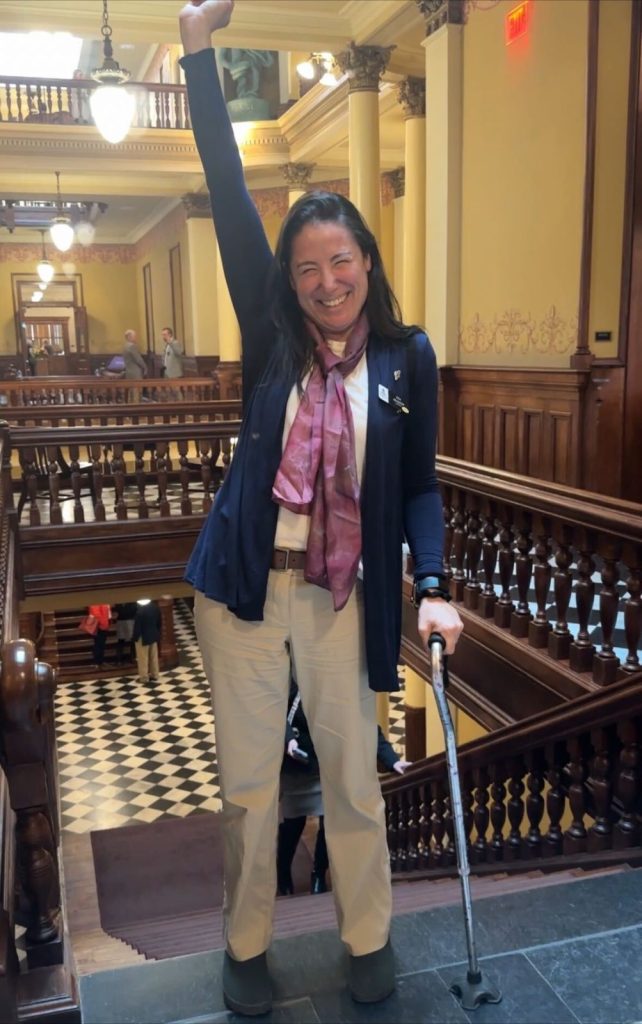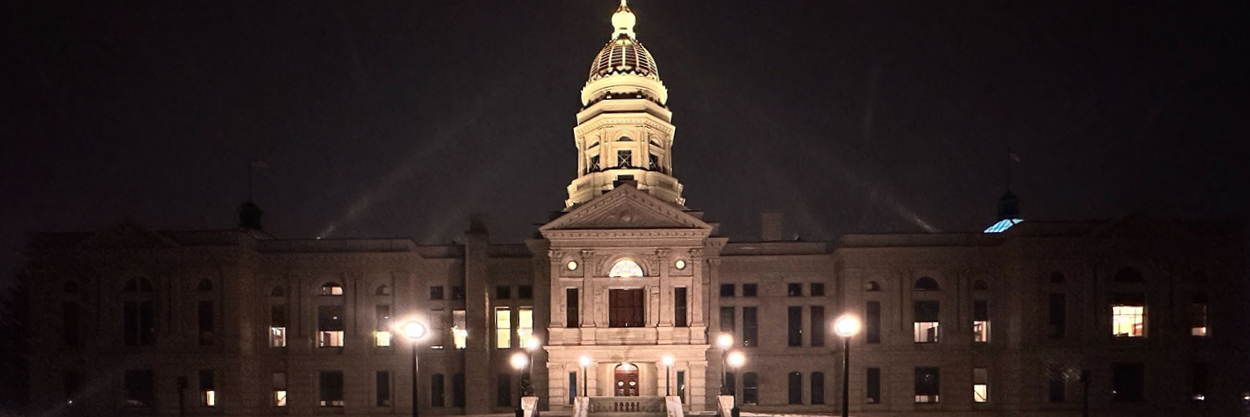On my final night in Cheyenne, I took a late night walk around the Capitol. Snowflakes calmed the chaos in my mind from the past week, and the building’s beauty stood out against the backdrop of lights. As the 2024 session closed, I enjoyed a moment of quiet celebration.
Personally, I celebrated my increased mobility (even being able to walk is a joy) and all that I’d learned during my first full session. Professionally, I celebrated conservation wins, the support of the Outdoor Council team, and you — our active, engaged members.
It was also a moment to reflect on how beautiful the legislative process really is. Despite the divides, and the politics, our Wyoming system remains accessible to all. Our citizen legislators will return home to our communities. Meet them. Thank them for their work. Get to know them (their contact information is readily available) and share your hopes for conservation and Wyoming’s future. This is how we can build bridges and make a difference.

KEY UPDATES
- All bills are dead, signed into law, or awaiting Governor Gordon’s signature or veto.
- Because the legislature has adjourned, no veto overrides by the legislature are possible.
ACTIONS TO TAKE
Thank your legislators. Your elected officials spent a long month (with many late nights!) away from home. Find your legislators and thank them for their work. You can also thank lawmakers who voted for something important to you: On this webpage, navigate to the ‘Votes’ tab of any bill to see the recorded votes.

WHERE THINGS LANDED
In a budget session, a bill must jump 17 hurdles before becoming law. As of this weekend, 48 of the more than 70 bills we tracked missed a hurdle and died. 13 cleared every hurdle and have been signed into law. 16 are approaching the final hurdle: they’ve passed through the legislature and now await action from the governor.
The latter category includes the budget bills. Despite a tumultuous path in our politically divided legislature, the second Joint Conference Committee worked quickly last Tuesday to craft a compromise budget bill. On Friday, the final day of the session, we held our breath and watched as the House voted to approve it, 41 to 21. The Senate vote nearly came down to the wire, but it too passed, 17-14.
How did conservation fare in the compromise budget? The final bill included funding we supported for new positions in the Department of Environmental Quality, the Office of State Lands and Investments, the Wyoming Energy Authority, and the Grants Management Office. We’re also pleased to report that the budget also included $9 million to fight invasive grasses, with no financial match requirement. Finally, we’re delighted that the sale of the Kelly Parcel to the federal government remains, though we’re still concerned about stipulations tying it to management actions in the Rock Springs Resource Management Plan.
GOOD NEWS
HB0033 | Mining operations – blasting requirements | Now law
This bill expands the Department of Environmental Quality’s oversight to include blasting at non-coal mines, thereby increasing human, structural, and environmental safety.
HB0035 | Limitation on environmental rulemaking | Now law (without any bad amendments)
This bill puts into law existing Department of Environmental Quality regulations for actions more strict than those required by the federal government. It escaped amendments that could have prohibited the DEQ from doing anything more strict than what the federal government requires, which would limit Wyoming’s ability to solve its own environmental problems.
HB0067 | Outdoor Recreation and Tourism Trust Fund Administration-2 | Now law
This bill establishes guidelines for administering the Outdoor Recreation and Tourism Trust Fund, which was established in 2023. It is a first step in state recognition of and planning for the impact of recreation on wildlife.
SJ0001 | Resolution demanding equal footing | Died
This resolution demanded the return of federal lands within Wyoming’s borders to the state.
SF0064 | Mineral royalties – proportional severance tax refunds | Died
This bill would refund part of the state’s portion of increased federal royalty rates back to extractors. Passing this bill would harm Wyoming’s financial outlook without bringing about the desired growth in extraction.
SF0072 | Utility donations | DiedThis bill would prohibit utilities from making donations and having them included in their customer rate base. It was part of an attempt to erode Wyoming’s net-metering statute.
BAD NEWS
SF0013 | Federal land use plans – legal actions authorized | Awaiting governor’s signature or veto
This bill provides the legislature or two-thirds of the Management Council $75 million (increased by a third-reading amendment from $50 million) in funds to sue the federal government in order to “protect the rights, powers and interests of the legislature.” The constitutionality of this bill is questionable.
SF0042 | Low-carbon reliable energy standards – amendments | Now law (Read more)
This bill amends requirements set by HB200 in 2020 to mandate carbon capture on coal-fired power plants in an effort to support the coal industry. This lowers carbon capture standards, increases the amount of time utilities have to meet them, and leaves ratepayers on the hook for the costs.
SF0044 | Limited mining operations – amendments | Awaiting governor’s signature or veto
This bill expands the types of mines that are 15 acres or less that do not require a full mine permit. This would mean less oversight from the Department of Environmental Quality and no public comment requirements on operations that could now include gold, lithium, and rare earth metals.
HB0094 | Net Metering | Died
This bill would have increased the generation cap for net-metering systems, allowing businesses, irrigators, municipalities and anyone who uses more than the 25kW limit to produce more of their own energy.
We will share more information about the bills we supported and opposed (and what their fate means for Wyoming) in our upcoming Conservation Vote Report. In the meantime, check out the final status of bills in our bill tracker and take a look at past Conservation Vote Reports.
WHAT’S NEXT
Gov. Mark Gordon has three options for the remaining bills on his desk: sign them into law, veto them, or allow them to become law without his signature, which signals disapproval. He will also review the budget, where he can veto specific lines but not the entire bill.
While the next legislative session doesn’t begin until January 14, 2025, legislative work happens year round in committees, where members explore assigned topics and draft bills for the next session. Committee meetings are open to the public and are a great place to meet legislators and ask them to spend time on matters that reflect conservation values. Find committee schedules by using the dropdown menus here. (More meetings will be added in the coming weeks.)
While these meetings are getting underway, state agencies will begin the rulemaking process to implement the new laws passed this session. This process has opportunities for public comment and is a great way to stay involved in issues that are important to you — learn more here. You can count on us to keep you in the loop every step of the way.
Finally, I’d like to thank you for your support. As we work together to protect clean air, clean water, wildlife, and public lands, your voice is crucial. Sharing your values with your elected officials (via email, phone calls, or meeting them in person) is where good state policy begins. Keep doing this through the interim!
It’s been a pleasure to share updates with you this session. I hope to see you at an interim committee meeting.
P.S. If you’ve appreciated our legislative coverage and would like to keep this vital work going through the interim, consider making a gift to the Outdoor Council. Your contributions enable year-round advocacy for all that we treasure about Wyoming.

